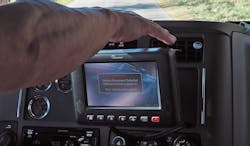Trucking Alliance: THUD's 73-hour cap could be confusing, counterproductive
The Trucking Alliance, representing several large truckload carriers and focused on issues related to truck driver safety and working conditions, has come out against language in a DOT funding bill that would cap the driver work week at 73 hours. The Alliance cites potential confusion over the clause, as well the risk of “political decisions” that bypass the rulemaking process and “sound science.”
“The Trucking Alliance urges the U.S. Senate to avoid codifying a ’73 hours in a 7-day period’ that could be counterproductive to truck driver safety and would also preempt the Federal Motor Carrier Safety Administration from making changes if this political change proves unsafe,” the group’s statement says.
At issue is language in the Senate’s $56.5 billion FY2017 Transportation, Housing and Urban Development, and Related Agencies (THUD) Appropriations Act that is designed to correct a problem with wording in last year’s budget package dealing with hours of service and the restart provision.
Specifically, the “fix” states that if the pre-July 2013 34-hour restart rule is restored, “then drivers who use the 34-hour restart may not drive after being on duty more than 73 hours in a 7-day period.”
The Alliance urges the Senate to delete the provision from the bill, arguing that:
- Congress has mandated that interstate trucking companies install electronic logging devices (ELDs) by December 2017 to verify truck driver hours-of-service compliance. The statistical data produced by this technology should guide future changes in truck driver hours of service rules, rather than a political decision by Congress.
- The FMCSA should keep its rule making authority over all aspects of truck driver hours of service rules. Codifying any part of the rule, as this language does, would make it virtually impossible for the FMCSA to change the rule, if ELD data show adjustments to the rule are necessary to reduce truck driver fatigue.
- The proposed ’73-hours in a 7-day period’ would create widespread confusion throughout the industry, since drivers operate under either a ’60-hour/7 days limit’ or a ’70-hour/8 days limit.’
- Congress would unwittingly override existing rules and by adopting this language, actually create an additional 13 hours of work for drivers who are on the 60 hour/7-days schedule.
Among the other issues of its safety agenda, the Trucking Alliance supports mandated electronic logging devices in all trucks, comprehensive drug testing of truck drivers, a clearinghouse to prevent truck driver job applicants from driving if they have previously failed a required drug test, mandatory truck speed limiters, the adoption of new truck safety technologies, and increased funds for state commercial vehicle enforcement agencies.
About the Author
Kevin Jones 1
Editor
Kevin has served as editor-in-chief of Trailer/Body Builders magazine since 2017—just the third editor in the magazine’s 60 years. He is also editorial director for Endeavor Business Media’s Commercial Vehicle group, which includes FleetOwner, Bulk Transporter, Refrigerated Transporter, American Trucker, and Fleet Maintenance magazines and websites.
